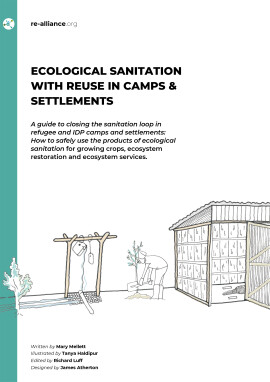
Bridging the WASH Humanitarian–development Divide
Building a sustainable reality
Marielle Snel, Nikolas Sorensen
The provision of safe and sufficient water, sanitation, and hygiene (WASH) services is essential to protecting human health and providing an environment in which people can develop and maintain livelihoods. This is especially true in humanitarian crises, during which safe access to these services is frequently disrupted, often for long periods of time. Humanitarian crises are growing in length and complexity due to external destabilising forces that include the impacts of climate change and ongoing geo-political instabilities. As a result, traditional emergency programming does not effectively address the needs of modern WASH crises. Humanitarian and development WASH professionals must work together in a more coordinated manner to develop effective humanitarian WASH programming that keeps long-term development goals in mind.
The authors discuss lessons learned across Africa, Asia, and the Middle East that will inspire humanitarian, development, and other professionals, in and outside the WASH sector, to improve the long-term impact of sustainable WASH programmes in humanitarian contexts. Case studies and conversations with WASH thinkers and programme designers invite readers to reflect on the WASH humanitarian and development divide and reflect on the future of the WASH sector. This book also reflects on how WASH is more than just water service delivery; it is a major contributing factor in facilitating child protection, education, health, and economic recovery. When there is strong inter-sectoral coordination with a strategic, adequate, coherent, and effective response to a humanitarian crisis with a vision for the transition to development, everyone wins.
Published: 2021
Pages: 126
eBook: 9781788531764
Paperback: 9781788531733
Hardback: 9781788531740
The authors discuss lessons learned across Africa, Asia, and the Middle East that will inspire humanitarian, development, and other professionals, in and outside the WASH sector, to improve the long-term impact of sustainable WASH programmes in humanitarian contexts. Case studies and conversations with WASH thinkers and programme designers invite readers to reflect on the WASH humanitarian and development divide and reflect on the future of the WASH sector. This book also reflects on how WASH is more than just water service delivery; it is a major contributing factor in facilitating child protection, education, health, and economic recovery. When there is strong inter-sectoral coordination with a strategic, adequate, coherent, and effective response to a humanitarian crisis with a vision for the transition to development, everyone wins.
| 1. Introduction | |||
|---|---|---|---|
| 2. Considerations around WASH and the nexus | |||
| 3. Country case studies from the field | |||
| 4. The role of non-household settings | |||
| 5. Moving forward: bridging the divide |
‘The book is a ‘must-read’ for those working in the humanitarian and development sectors, in the field of WASH and beyond. The rich compilation of lessons learned, case studies and conversations from a diverse array of WASH experts provides valuable insight on the humanitarian and development divide and the future of the WASH sector.’
Monica Ramos, Global WASH Cluster Coordinator, UNICEF
‘Ongoing conflicts and complex humanitarian situations around the globe mean the average length of protracted refugee situations now exceeds twenty years. Away from home, refugees and internally displaced people are among the most vulnerable and disadvantaged groups, often denied access to basic water supply and sanitation services, and at risk of being 'left behind' as the world strives to achieve the Sustainable Development Goal (SDG) 6 target of ‘safe drinking water and sanitation for all. It is therefore more important than ever to grapple with the challenge of bridging the WASH humanitarian - development divide to ensure refugees do not remain dependent recipients of unsustainable humanitarian aid. Rather, the focus must be on enabling refugee self-reliance and including refugees in sustainable development programmes for provision of equitable WASH services.
Bridging the WASH Humanitarian - Development divide: Building a sustainable reality, authored by Mariëlle Snel and Nikolas Sorensen, is a welcome contribution, providing insights and guidance for one of the most complex issues that the world must overcome to ensure no one is 'left behind' as we strive together to achieve the UN Sustainable Development goals.’
Murray Burt, Chief Engineer at Auckland Transport (NZ Government); former UNHCR HQ Global Senior WASH Officer
‘An important contribution to moving forward the WASH humanitarian-development-peace nexus agenda, especially from the humanitarian perspective.’
Tim Grieve, Senior Consultant, water, sanitation and public health; former UNICEF HQ senior advisor- Emergency water sanitation and hygiene





